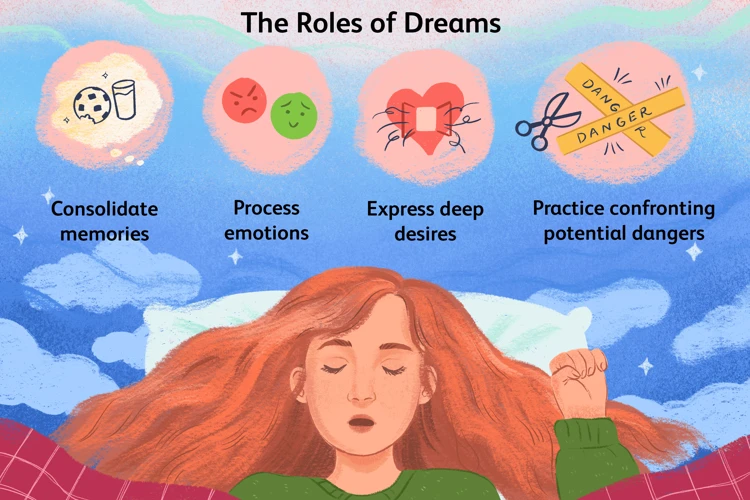The enigma of recurring dreams holds a captivating allure as it provides us with mysterious glimpses into the depths of our unconscious minds. These dreams, which repetitively invade our sleep, offer a wealth of valuable insights and revelations. By delving into the essence of recurring dreams, analyzing their symbolism, and unraveling the secrets they hold, we can gain a deeper understanding of our inner selves. In this article, we will explore the various dimensions of recurring dreams, decipher their hidden meanings, and discover strategies to cope with their persistent presence. So, let us embark on this enigmatic journey into the depths of our own minds.
Understanding Recurring Dreams

To truly comprehend the intricacies of recurring dreams, it is essential to delve into their nature and explore the common patterns that govern them. Understanding recurring dreams starts with acknowledging their definition as dreams that occur repeatedly over a period of time. These dreams can manifest in various forms, ranging from nightmares to pleasant scenarios, making it crucial to recognize the diverse types of recurring dreams encountered by individuals. Additionally, the frequency of these dreams varies from person to person, with some experiencing them sporadically while others have them on a regular basis. By comprehending these fundamental aspects of recurring dreams, we can begin to decode their hidden symbolism, unlock their deeper meaning, and ultimately gain a deeper understanding of our unconscious mind. For a comprehensive guide on how to interpret recurring dreams, check out thislink.
1. Definition of Recurring Dreams
Definition of Recurring Dreams: Recurring dreams, as their name suggests, are a type of dream that reoccurs multiple times over a certain period. They are characterized by their persistent nature and the repeated appearance of similar imagery, themes, or scenarios. These dreams often leave a lasting impression on the dreamer, as they can be vivid and emotionally intense. The defining factor of recurring dreams is their frequency, as they occur more frequently than typical one-time dreams. While the specific content and symbolism of recurring dreams may vary from person to person, the repetitive nature of these dreams suggests that they hold significant meaning and significance in the dreamer’s subconscious mind. Understanding the definition of recurring dreams is the first step in unraveling their deeper messages and unraveling the secrets they hold. For a deeper exploration of the psychological significance of recurring dreams, refer to thislink.
2. Common Types of Recurring Dreams
Common Types of Recurring Dreams can vary widely from person to person, but there are certain themes and scenarios that tend to be prevalent. These dreams often reflect our fears, worries, desires, or unresolved issues in waking life. Some of the most common types of recurring dreams include:
1. Falling: Falling dreams are incredibly common and can leave us with a sense of vulnerability and helplessness. These dreams often represent a lack of control or anxiety about a situation in our lives. They may serve as a reminder to address our fears and regain a sense of stability.
2. Being Chased: Being chased in a dream can induce feelings of fear, panic, and the urge to escape. These dreams may be a reflection of running away from something in our waking lives – perhaps an unresolved conflict, a challenging situation, or a person who is causing stress or pressure. They might be a sign that we need to confront these issues head-on.
3. Teeth Falling Out: Many people experience dreams where their teeth fall out or crumble. These dreams are often associated with feelings of insecurity, loss, or a fear of aging or losing attractiveness. They can also indicate concerns about communication or feeling powerless in a particular situation.
4. Flying: Flying dreams are generally positive and exhilarating experiences. These dreams signify a sense of freedom, success, or triumph over challenges. They can also represent a desire for personal growth or escaping limitations in our lives.
5. Being Naked in Public: Dreams of being naked in public can evoke intense feelings of embarrassment and vulnerability. These dreams often relate to a fear of being exposed or judged by others. They might indicate a lack of confidence or a need to embrace and accept who we truly are, without fear of judgment.
Understanding the common themes and symbolism behind recurring dreams can provide valuable insights into our subconscious mind. For a deeper exploration of symbolic interpretations in dreams, you can visit thislink.
3. Frequency of Recurring Dreams
The frequency of recurring dreams can vary greatly among individuals. While some people may experience these dreams sporadically throughout their lives, others may have them on a more frequent basis. Factors such as stress levels, personal experiences, and emotional or psychological states can influence the likelihood of having recurring dreams. It is not uncommon for recurring dreams to occur during periods of heightened stress or significant life changes. These dreams may serve as a reflection of the mind’s attempt to process and make sense of these experiences. Individuals who have a strong emotional connection to certain themes or symbols may be more prone to experiencing recurring dreams centered around those specific elements. Understanding the frequency of recurring dreams is vital in deciphering their underlying messages and gaining insights into the subconscious mind. By keeping track of the frequency of these dreams through a dream journal, individuals may identify patterns, triggers, and recurring themes, providing valuable clues to unravel the deeper meanings behind the dreams.
Interpreting Recurring Dreams

Interpreting recurring dreams is a fascinating endeavor that allows us to unravel the intricate messages hidden within the realm of our subconscious minds. One crucial aspect of interpretation involves analyzing the symbolism and themes that manifest in these dreams. Symbols act as a language of the unconscious, and by deciphering their meanings, we can gain valuable insights into our innermost thoughts, desires, and fears. Additionally, identifying patterns and triggers within recurring dreams can provide valuable clues about their significance and potential connections to our waking lives. By keeping a detailed dream journal, we can document and analyze these recurring dreams, enabling us to uncover recurring patterns and themes. This aids in decoding their messages and understanding their psychological implications. So, grab a pen and embark on the journey of interpreting your recurring dreams to unlock the secrets they hold within. For common themes and symbolic interpretations of recurring dreams, visit this link.
1. Analyzing Symbolism and Themes
Analyzing the symbolism and themes present in recurring dreams is a key step in unraveling their deeper meaning. By examining the various symbols and motifs that appear in these dreams, we can gain valuable insights into our unconscious minds. It is essential to keep a dream journal, noting down every detail and imagery from each recurring dream. This aids in identifying recurring symbols and themes, allowing us to establish connections and patterns. Once we have identified these symbols, it is helpful to research their potential meanings, drawing from various sources such as dream dictionaries or psychological interpretations. However, it is important to remember that personal associations with symbols may differ, so it is crucial to consider our own unique experiences and emotions related to these symbols. The next step involves reflecting on the emotions and feelings evoked by the recurring dream as they may provide further clues to its significance. Analyzing the larger themes and storylines woven within these dreams can also shed light on recurring patterns or unresolved conflicts in our waking lives. By exploring the rich symbolism and themes of our recurring dreams, we can gain a deeper understanding of our inner selves and the messages our unconscious mind is trying to convey.
2. Identifying Patterns and Triggers
Identifying patterns and triggers is a crucial step in unraveling the mysteries of recurring dreams. By carefully examining the content and emotions associated with these dreams, we can start to recognize recurring motifs and themes that emerge. These patterns can be related to specific situations, people, or emotions that repeatedly manifest in our dreams. Paying attention to these recurring patterns can provide valuable insights into our subconscious mind and shed light on unresolved issues or deep-seated fears that need attention. Additionally, triggers play a significant role in recurring dreams. Triggers can be external factors, such as certain events or stressors in our waking life, that influence the recurrence of specific dreams. By identifying these triggers, we can gain a better understanding of the underlying causes of our recurring dreams and potentially work towards resolving the issues they represent. Keeping a dream journal can be immensely helpful in identifying and documenting these patterns and triggers. By recording our dreams regularly, we can detect recurring elements and make connections between our dreams and our waking life experiences. This self-reflection can offer valuable insights that can aid in the interpretation and interpretation of recurring dreams. So, pay close attention to the patterns and triggers that arise in your dreams, as they hold the key to unlocking the secrets of your unconscious mind.
3. Utilizing Dream Journals
Utilizing dream journals is a valuable tool in deciphering the mysteries of recurring dreams. Keeping a dedicated journal to record dreams helps in capturing and preserving the details of each dream as soon as you wake up. By writing down vivid descriptions, emotions, and symbols encountered in each dream, you create a tangible record that can be accessed later for analysis and interpretation. The act of writing itself also reinforces the connection between the conscious and unconscious mind, allowing you to deepen your understanding of recurring dreams. When reviewing your dream journal, look for common themes, symbols, or patterns that emerge across multiple dreams. These recurring elements can provide clues to the underlying messages and themes within your dreams. By observing and analyzing these patterns, you can gain insights into your subconscious desires, fears, and unresolved issues. Additionally, recording any associations or real-life events connected to your dreams can offer further insight into the triggers and meanings behind recurring dreams. So, grab a notebook or use a dream journal app, and make it a habit to record your dreams each morning. The power of journaling can help unlock the enigmatic symbolism of your recurring dreams and guide you on a journey of self-discovery.
The Unconscious Mind and Recurring Dreams

The realm of recurring dreams provides a fascinating gateway into the workings of our unconscious mind. The unconscious mind plays a significant role in shaping our dreams, as it is a reservoir of our deepest desires, fears, and emotions. It is believed that recurring dreams serve as a means of communication between our conscious and unconscious selves, offering profound insights and messages that are often overlooked or ignored in our waking lives. These dreams can act as a mirror, reflecting unresolved issues, conflicts, or unresolved emotions that reside within us. By exploring the role of the unconscious mind in recurring dreams, we gain a deeper understanding of the psychological significance they hold. This understanding can open doors to self-discovery, personal growth, and a better understanding of ourselves. To delve into the psychological significance of recurring dreams, you can refer to this informativelink.
1. Role of the Unconscious Mind
The role of the unconscious mind in recurring dreams is a fascinating subject that delves into the depths of our psyche. The unconscious mind is a reservoir of thoughts, feelings, desires, and memories that are not readily accessible to our conscious awareness. In the context of recurring dreams, the unconscious mind serves as the storehouse of unresolved issues, buried emotions, and unprocessed experiences that continue to resurface during sleep. These unresolved aspects of our lives find expression in our dreams, oftentimes in symbolic form. By paying attention to recurring dream motifs and symbols, we can gain valuable insights into the hidden conflicts, unresolved emotions, and unacknowledged desires that reside within our unconscious mind. Exploring the role of the unconscious mind in recurring dreams allows us to bridge the gap between our conscious and unconscious selves, unravel the mysteries of our inner world, and embark upon a path of self-discovery and personal growth.
2. Unconscious Communication through Dreams
Unconscious communication through dreams serves as a unique channel through which our subconscious mind can express itself. When we dream, our unconscious mind has the opportunity to bypass the constraints of our waking consciousness and directly communicate with us. This form of communication occurs through powerful symbols, vivid imagery, and emotional experiences that are often deeply rooted in our personal experiences and emotions. Our unconscious mind uses these elements to convey messages, insights, and even warnings that may be difficult to access in our waking state. This communication can be highly metaphorical, as the unconscious mind speaks in the language of symbols, archetypes, and abstract concepts. It is through the interpretation of these symbolic messages that we can gain valuable self-knowledge, unravel hidden desires, and process unresolved emotions. By paying attention to the recurring themes and symbols in our dreams, we can unlock the messages encoded in our unconscious communication and gain a deeper understanding of ourselves and our inner world.
3. Psychological Significance
The psychological significance of recurring dreams is a fascinating field of study that offers valuable insights into our innermost thoughts, emotions, and fears. These dreams are not mere random occurrences but can be seen as powerful messages from our subconscious mind. They serve as a reflection of our unresolved conflicts, suppressed desires, and unresolved traumas. Recurring dreams often highlight unresolved psychological issues that require our attention, urging us to confront and address them in order to achieve personal growth and healing. By analyzing the recurring themes, symbols, and emotions present in these dreams, we can gain a deeper understanding of our psyche and uncover aspects of ourselves that may have been hidden or overlooked. Exploring the psychological significance of recurring dreams can provide profound self-discovery and assist us on the path to self-improvement. It is important to approach this analysis with a sense of curiosity and open-mindedness, allowing ourselves to explore the depths of our subconscious in order to gain a better understanding of our psychological well-being. For more insights into the psychological significance of recurring dreams, you can refer to this comprehensive resource here.
Common Interpretations of Recurring Dreams

Common interpretations of recurring dreams reveal fascinating insights into the depths of our subconscious and the underlying emotions and fears that shape our waking lives. One prevalent recurring theme is the sensation of falling, which often signifies a sense of insecurity or lack of control in our daily lives. Being chased in a dream may represent unresolved conflicts or anxieties we are evading. The symbolism of teeth falling out can point to a fear of losing power or experiencing a loss of confidence. In contrast, the act of flying in a dream can symbolize a desire for freedom, liberation, or transcendence. Finally, the unsettling dream of being naked in public often represents vulnerability or feelings of shame. Exploring these common interpretations of recurring dreams can offer valuable insights into our deepest fears, desires, and underlying psychological states. For a deeper exploration of symbolic interpretations and common themes in recurring dreams, visit this link.
1. Falling
The recurring dream of falling can evoke a sense of fear and vulnerability in those who experience it. It is a common theme that often signifies a lack of control or a fear of losing stability in one’s life. When analyzing the symbolism behind this dream, it is essential to consider the context and emotions associated with the falling experience. Falling can represent a fear of failure or a sense of insecurity in making important life decisions. It may also indicate a need to let go of control and trust in the process of life. In some cases, this dream may reflect a deeper psychological issue, such as low self-esteem or a fear of being judged by others. By exploring the recurring dream of falling and examining the emotions and situations associated with it, individuals can gain insights into their subconscious fears and work towards addressing them. For more information on common themes and symbolic interpretations of recurring dreams, refer to thislink.
2. Being Chased
One of the most common recurring dreams experienced by individuals is the sensation of being chased. This intense and anxiety-inducing dream often leaves individuals feeling overwhelmed and helpless. The theme of being chased in dreams can take various forms, such as being pursued by an unknown figure, an animal, or even a supernatural entity. The emotions evoked during this dream can range from fear and panic to adrenaline-fueled excitement.
The symbolism behind being chased in dreams is multifaceted but often represents a sense of avoidance or evasion of a particular issue or problem in one’s waking life. It may reflect unresolved conflicts or deep-seated fears that have yet to be confronted. Alternatively, being chased in a dream can symbolize feeling overwhelmed by responsibilities or pressures, with the pursuit representing the relentless demands of life.
It is essential to pay attention to the surroundings and the pursuer in these dreams, as they can provide valuable insight into the underlying meaning. For instance, being chased in a familiar location could signify that the issue or problem being avoided is close to home, while being chased by a faceless entity may suggest a fear of the unknown.
Understanding the meaning behind being chased in recurring dreams can offer individuals an opportunity for self-reflection and personal growth. Exploring the root causes of the chase and addressing the underlying fears or conflicts can help individuals regain a sense of control in their waking lives. For more information on common themes and symbolic interpretations of recurring dreams, check out this link.
3. Teeth Falling Out
The symbolism behind the recurring dream of teeth falling out can be perplexing and thought-provoking. This dream is surprisingly common and can leave individuals with a sense of unease upon waking. While the actual interpretation may vary depending on personal experiences and cultural beliefs, there are several common themes associated with this dream. One interpretation suggests that losing teeth symbolizes a fear of losing control in one’s life, whether it be in relationships, career, or personal endeavors. It can represent a feeling of powerlessness or vulnerability. Another interpretation relates the dream to issues with communication or expression. Just as teeth are essential for speaking clearly, the dream may be a manifestation of anxiety or difficulties in effectively getting one’s point across. Additionally, this dream can be linked to concerns about appearance or aging, as teeth are often associated with youth and beauty. Exploring the underlying emotions and personal experiences related to these symbolic interpretations can provide valuable insights into the subconscious mind. For more common themes and symbolic interpretations of recurring dreams, refer to this link.
4. Flying
Flying is a recurring dream theme that captivates the imagination and leaves dreamers exhilarated. This dream symbolizes a sense of freedom, liberation, and transcendence from everyday constraints. Often, it is associated with feelings of empowerment and a desire for personal growth. Flying dreams can manifest in different scenarios, ranging from effortlessly gliding through the sky to soaring over stunning landscapes. The sensation of flying in dreams is often described as euphoric, with the ability to control speed and direction. It is important to consider the context and emotions associated with flying dreams for a deeper interpretation. For some, the dream may represent a need for escape or a longing for more control in their waking lives. Alternatively, it can symbolize a heightened sense of confidence and ambition, as flying represents the ability to rise above challenges. Exploring the specific details and emotions experienced during a flying dream can provide valuable insights into the dreamer’s desires, aspirations, and the obstacles they may be seeking to overcome. For more common interpretations of recurring dreams, you can refer to this link.
5. Being Naked in Public
Being Naked in Public is a common recurring dream that can evoke a range of emotions, from embarrassment to vulnerability. When deciphering the meaning behind this dream, it is essential to consider the symbolic implications rather than interpreting it literally. This dream often signifies feelings of exposure, insecurity, or the fear of being judged by others. It may indicate a sense of vulnerability or the fear of revealing one’s true self or innermost thoughts and emotions. It could also reflect a fear of being unprepared or lacking control in a particular situation. Exploring the context and emotions experienced within the dream can provide further insights into its underlying message. It is important to note that the interpretation of this dream can vary based on the individual’s personal experiences and emotions associated with public exposure. To explore more common themes and symbolic interpretations of recurring dreams, refer to thislink.
Dealing with Recurring Dreams
When it comes to dealing with recurring dreams, it is important to empower oneself with effective strategies that can help navigate and alleviate their impact. The first step in managing these dreams is to engage in self-reflection and increase self-awareness. Taking the time to introspect and explore the underlying emotions and themes of these dreams can provide valuable insights into unresolved issues or anxieties. Seeking professional help, such as consulting with a therapist or dream analyst, can also offer guidance and support in deciphering the meaning behind recurring dreams. Additionally, exploring techniques for lucid dreaming can provide a sense of control and enable individuals to actively reshape their dreamscape. By employing a combination of self-reflection, professional guidance, and lucid dreaming techniques, individuals can embark on a journey of self-discovery and ultimately find solace in dealing with recurring dreams.
1. Self-Reflection and Awareness
Self-reflection and awareness play a crucial role in dealing with recurring dreams. By taking the time to reflect on the content and emotions within these dreams, individuals can gain valuable insights into their inner thoughts and feelings. Engaging in self-reflection involves exploring the symbolism, themes, and emotions present in the dreams. This can be done by asking questions such as “What do the recurring symbols represent to me?” or “What emotions arise when experiencing these dreams?”. By bringing awareness to these patterns and emotions, individuals can uncover underlying issues or unresolved conflicts that may be influencing these dream repetitions. Self-reflection can aid in identifying any possible triggers or stressors in waking life that may be connected to the recurring dreams. Developing a practice of self-reflection and awareness can empower individuals to better understand themselves, make necessary changes, and ultimately reduce or even resolve the occurrence of recurring dreams.
2. Seeking Professional Help
When dealing with recurring dreams that cause distress or interfere with daily life, seeking professional help can provide valuable support and guidance in understanding and resolving these experiences. Mental health professionals, such as psychologists or therapists, have the expertise to analyze recurring dreams within the context of an individual’s overall mental and emotional well-being. They can help identify any underlying psychological factors contributing to the dreams and provide tools and strategies to address them effectively. A professional can also guide individuals in exploring the subconscious messages conveyed by the dreams and assist in developing coping mechanisms to manage any related anxiety or stress. Therapy sessions may involve techniques such as dream analysis or cognitive-behavioral therapy to explore the deeper meanings behind the dreams and facilitate resolution. Seeking professional help can empower individuals to navigate the complexities of recurring dreams while fostering personal growth and emotional well-being. Whether the dreams stem from past traumas, unresolved issues, or unresolved conflicts, a qualified professional can provide the necessary support to navigate and interpret them.
3. Lucid Dreaming Techniques
Lucid dreaming techniques serve as a powerful tool for those seeking to gain control and explore the depths of their recurring dreams. A lucid dream is a type of dream where the dreamer becomes aware that they are dreaming while still in the dream state. This awareness allows individuals to actively participate and manipulate the dream narrative, opening up a world of endless possibilities. One effective technique to induce lucid dreaming is reality testing, which involves regular questioning of one’s reality throughout the day. By habitually checking if you are dreaming or awake, you increase the chances of becoming lucid in your recurring dreams. Another technique is keeping a dream journal, a practice where you record your dreams immediately upon waking. This not only helps with recall but also encourages conscious awareness of dream patterns. Additionally, practicing visualization exercises before sleep, such as imagining yourself becoming lucid in a dream, can help set the intention for lucidity during your recurring dreams. By employing these lucid dreaming techniques, individuals can actively engage with their recurring dreams and unlock the potential for self-discovery and personal growth.
Conclusion
In conclusion, recurring dreams provide us with a fascinating window into the depths of our unconscious minds. Through the analysis of their symbolism, identification of patterns and triggers, and utilization of dream journals, we can unlock the hidden meanings behind these persistent dreams. The role of the unconscious mind in generating and communicating through recurring dreams is essential, as it allows us to gain insights that may not be readily accessible in our waking lives. These dreams hold psychological significance and can serve as valuable tools for self-reflection and personal growth. While common interpretations of recurring dreams such as falling, being chased, teeth falling out, flying, and being naked in public exist, it is important to remember that the meaning of these dreams may vary for each individual. Therefore, self-reflection, seeking professional help if needed, and practicing lucid dreaming techniques are some strategies for dealing with recurring dreams. By embracing the enigmatic journey into our unconscious minds, we can unravel the mysteries that lie within and harness the power of our dreams for personal transformation and understanding. For a deeper exploration of the psychological significance of recurring dreams, you can visit this informative article on psychological significance of recurring dreams or learn about common themes and symbolic interpretations in this guide on common themes in recurring dreams.
Frequently Asked Questions
1. What causes recurring dreams?
The exact cause of recurring dreams is still not fully understood. However, they can be influenced by various factors including unresolved emotions, unresolved issues, traumatic experiences, or even certain medications.
2. Are recurring dreams common?
Yes, recurring dreams are fairly common. Many individuals report experiencing recurring dreams at some point in their lives. The frequency and intensity of these dreams can vary from person to person.
3. Can recurring dreams be interpreted in the same way for everyone?
No, recurring dreams can have unique meanings for each individual. The symbolism and interpretation of these dreams can be influenced by personal experiences, beliefs, and cultural backgrounds.
4. Are recurring dreams always negative or frightening?
No, recurring dreams can be either positive or negative. While some people have recurring nightmares or unsettling dreams, others may have recurring dreams that bring joy, inspiration, or curiosity.
5. Can recurring dreams predict the future?
Recurring dreams are not necessarily prophetic or predictive. They primarily reflect the unconscious mind’s attempt to process and communicate unresolved emotions or experiences.
6. Can recurring dreams be influenced by external factors?
Yes, recurring dreams can be influenced by external factors such as stress, changes in routine, or significant life events. These factors can impact the content and frequency of recurring dreams.
7. Can recurring dreams be stopped or prevented?
While there is no guaranteed way to stop recurring dreams, addressing underlying emotional or psychological issues through therapy or self-reflection can help reduce their frequency or intensity.
8. Can recurring dreams be connected to past traumas?
Yes, recurring dreams can sometimes be associated with past traumas or unresolved psychological wounds. They can serve as a means for the unconscious mind to process and heal from these experiences.
9. Can recurring dreams evolve or change over time?
Yes, recurring dreams can evolve and change over time. As individuals grow and undergo personal changes, the content and themes of recurring dreams may shift or transform.
10. When should I seek professional help for recurring dreams?
If recurring dreams are causing significant distress, affecting daily functioning, or interfering with sleep, it may be beneficial to seek guidance from a mental health professional who specializes in dream analysis or therapy.








